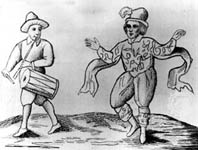| directory |
| home | contact |
|
|||||||||||||||
| search | |||||||||||||||
William Kempe
Thomas Nashe declared Kempe the successor to the great Elizabethan performer, Richard Tarlton. Kempe joined the Chamberlain's Men in 1594 and acted in many of Shakespeare's plays. He was the original portrayer of Dogberry in Much Ado About Nothing, Peter in Romeo and Juliet, and possibly Falstaff. He also likely played Lancelot Gobbo in The Merchant of Venice and Bottom in A Midsummer Night's Dream. However it appears that Kempe suddenly left the Chamberlain's Men in 1599. The reason for his departure is not documented, although many believe that he was asked to leave due to his chronic improvising, and that Shakespeare made reference to this in Hamlet: And let those that playOnce Kempe left the troupe Shakespeare's comic characters changed dramatically, indicating that earlier parts were written to fit Kempe's unique style. Examining Shakespeare's changes provides us with even more information about Kempe's stage presence. "He was a big man who specialized in Plebian clowns who spoke in earthly language...Kempe's characters have a tendency to confuse and mispronounce their words, and contemporary references to his dancing and ability to "make a scurvy face" suggest a physical brand of humour." (Boyce 335) Now finished with Shakespeare's troupe and looking for another way to entertain the people of London, Kempe planned a wild publicity stunt. In 1600 he danced a morris dance from London to Norwich, almost 100 miles north. He wrote his own account of the event called Kempe's Nine Days Wonder, and the picture above is from the cover of the original copy. Kempe returned to acting in 1601 when he left England to tour Europe. When he arrived home in 1602 he joined Worcester's Men, but he disappears from the records shortly after. Some scholars conclude that he died from the 1603 plague in London - the year of one of the largest outbreaks of the disease during Shakespeare's life.
How to cite this article:Related Articles
|
©1999-2021 Shakespeare Online. All Rights Reserved.
 William Kempe was one of the most beloved clowns in the Elizabethan theatre. Records tell us that Kempe was an actor with Leicester's Men on a tour of the Netherlands and Denmark in 1585-86. By 1593 Kempe was a member of Strange's Men, and theatre-goers and fellow actors were beginning to recognize his comedic talent.
William Kempe was one of the most beloved clowns in the Elizabethan theatre. Records tell us that Kempe was an actor with Leicester's Men on a tour of the Netherlands and Denmark in 1585-86. By 1593 Kempe was a member of Strange's Men, and theatre-goers and fellow actors were beginning to recognize his comedic talent.